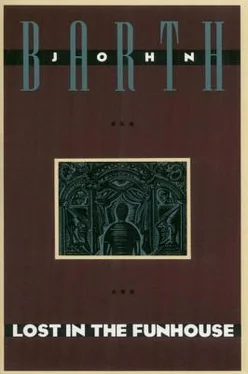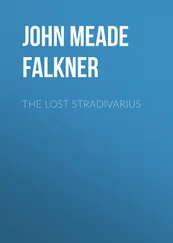John Barth - Lost in the Funhouse
Здесь есть возможность читать онлайн «John Barth - Lost in the Funhouse» весь текст электронной книги совершенно бесплатно (целиком полную версию без сокращений). В некоторых случаях можно слушать аудио, скачать через торрент в формате fb2 и присутствует краткое содержание. Год выпуска: 2014, ISBN: 2014, Издательство: Knopf Doubleday Publishing Group, Жанр: Современная проза, на английском языке. Описание произведения, (предисловие) а так же отзывы посетителей доступны на портале библиотеки ЛибКат.
- Название:Lost in the Funhouse
- Автор:
- Издательство:Knopf Doubleday Publishing Group
- Жанр:
- Год:2014
- ISBN:978-0-8041-5250-1
- Рейтинг книги:3 / 5. Голосов: 1
-
Избранное:Добавить в избранное
- Отзывы:
-
Ваша оценка:
- 60
- 1
- 2
- 3
- 4
- 5
Lost in the Funhouse: краткое содержание, описание и аннотация
Предлагаем к чтению аннотацию, описание, краткое содержание или предисловие (зависит от того, что написал сам автор книги «Lost in the Funhouse»). Если вы не нашли необходимую информацию о книге — напишите в комментариях, мы постараемся отыскать её.
Lost in the Funhouse — читать онлайн бесплатно полную книгу (весь текст) целиком
Ниже представлен текст книги, разбитый по страницам. Система сохранения места последней прочитанной страницы, позволяет с удобством читать онлайн бесплатно книгу «Lost in the Funhouse», без необходимости каждый раз заново искать на чём Вы остановились. Поставьте закладку, и сможете в любой момент перейти на страницу, на которой закончили чтение.
Интервал:
Закладка:
What was more, the Arnie twins were in fourth grade with him, though half again his age and twice his size; like Crazy Alice they inspired him with no great fear if Peter was along, but when he was alone it was another story. The Arnie twins lived God knew where: pale as two ghosts they shuffled through the alleys of East Dorset day and night, poking in people’s trashcans. Their eyes were the faintest blue, red about the rims; their hair was a pile of white curls, unwashed, unbarbered; they wore what people gave them — men’s vests over BVD shirts, double-breasted suit coats out at elbows, shiny trousers of mismatching stripe, the legs rolled up and crotch half to their knees — and ghostlike too they rarely spoke, in class or out. Many a warm night when Ambrose had finished supper and homework, had his bath, gone to bed, he’d hear a clank in the alley and rise up on one elbow to look: like as not, if it wasn’t the black dogs that ran loose at night and howled to one another from ward to ward, it would be the Arnie twins exploring garbage. Their white curls shone in the moonlight, and on the breeze that moved off the creek he could hear them murmur to each other over hambones, coffee grounds, nested halves of eggshells. Next morning they’d be beside him in class, and he who may have voyaged in dreams to Bangkok or Bozcaada would wonder where those two had prowled in fact, and what-all murmured.
“The truth of the matter is,” he said to his mother on an April day, “you’ve raised your son for a sissy.”
That initial phrase, like the word facts , was a favorite; they used it quite a lot on the afternoon radio serials, and it struck him as open-handed and mature. The case with facts was different: his mother and Uncle Karl would smile when they mentioned “the facts of life,” and he could elicit that same smile from them by employing the term himself. It had been amusing when Mr. Erdmann borrowed their Cyclopedia of Facts and Aunt Rosa had said “It’s time Willy Erdmann was learning a fact or two”; but when a few days later Ambrose had spied a magazine called Facts About Your Diet in a drugstore rack, and hardly able to contain his mirth had pointed it out to his mother, she had said “Mm hm” and bade him have done with his Dixie-cup before it was too late to stop at the pie-woman’s.
This afternoon he had meant to tell her the truth of the matter in an off-hand way with a certain sigh that he could hear clearly in his fancy, but in the telling his sigh stuck in his throat, and such a hurt came there that he remarked to himself: “This is what they mean when they say they have a lump in their throat. ”
Two mischances had disgraced him on the way from school. Half through Scylla and Charybdis, on the Scylla side, he had heard a buzzing just behind his hip, which taking for a bee he had spun round in mortal alarm and flailed at. No bee was there, but at once the buzzing recurred behind him. Again he wheeled about — was the creature in his pocket! — and took quick leaps forward; when the bee only buzzed more menacingly, he sprinted to the corner, heedless of what certain classmates might think. He had to wait for passing traffic, and observed that as he slowed and halted, so did the buzzing. It was the loose chain of his own jacknife had undone him.
“What’s eating you?” Wimpy James hollered, who till then had been too busy with Crazy Alice to molest him.
Ambrose had frowned at the pointing fingers of his watch. “Timing myself to the corner!”
But at that instant a loose lash dropped into his eye, and his tears could be neither hidden nor explained away.
“Scared of Kocher’s dog!” one had yelled.
Another sing-sang: “Sissy on Am-brose! Sissy on Am-brose!”
And Wimpy James, in the nastiest of accents:
“Run home and git
A sugar tit,
And don’t let go of it!”
There was no saving face then except by taking on Wimpy, for which he knew he had not courage. Indeed, so puissant was that fellow, who loved to stamp on toes with all his might or twist the skin of arms with a warty hot-hand, Ambrose was obliged to play the clown in order to escape. His father, thanks to the Kaiser, walked with a limp famous among the schoolboys of East Dorset, scores of whom had been chastized for mocking it; but none could imitate that walk as could his son. Ambrose stiffened his leg so, hunched his shoulders and pumped his arms, frowned and bobbed with every step — the very image of the Old Man! Just so, when the highway cleared, he had borne down upon his house as might a gimpy robin on a worm, or his dad upon some youthful miscreant, and Wimpy had laughed instead of giving chase. But the sound went into Ambrose like a blade.
“You are not any such thing!” his mother cried, and hugged him to her breast. “What you call brave, a little criminal like Wimpy James?”
He was ready to defend that notion, but colored Hattie walked in then, snapping gum, to ask what wanted ironing.
“You go on upstairs and put your playclothes on if you’re going down to the Jungle with Peter.”
He was not deaf to the solicitude in his mother’s voice, but lest she fail to appreciate the measure of his despair, he climbed the stairs with heavy foot. However, she had to go straighten Hattie out.
When vanilla-fudge Hattie was in the kitchen, Mother’s afternoon programs went by the board. Hattie had worked for them since a girl, and currently supported three children and a husband who lost her money on the horses. No one knew how much if anything she grasped about his betting, but throughout the afternoons she insisted on the Baltimore station that broadcast results from Bowie and Pimlico, and Ambrose’s mother had not the heart to say no. When a race began Hattie would up-end the electric iron and squint at the refrigerator, snapping ferociously her gum; then she acknowledged each separate return with a hum and a shake of the head.
“Warlord paid four-eighty, three-forty, and two-eighty …”
“Mm hm.”
“Argonaut, four-sixty and three-forty …”
“Mm hm. ”
“Sal’s Pride, two-eighty …”
“Mmmm hm! ”
After which she resumed her labors and the radio its musical selections until the next race. This music affected Ambrose strongly: it was not at all of a stripe with what they played on Fitch Bandwagon or National Barn Dance; this between races was classical music, as who should say: the sort upper-graders had to listen to in class. Up through the floor of his bedroom came the rumble of tympani and a brooding figure in low strings. Ambrose paused in his dressing to listen, and thinking on his late disgrace frowned: the figure stirred a dark companion in his soul. No man at all! His family, shaken past tears, was in attendance at his graveside.
“I’ll kill that Wimpy,” Peter muttered, and for shame at not having lent his Silver King bike more freely to his late brother, could never bring himself to ride it again.
“Too late,” his father mourned. Was he not reflecting how the dear dead boy had pled for a Senior Erector Set last Christmas, only to receive a Junior Erector Set with neither electric motor nor gearbox?
And outside the press of mourners, grieving privately, was a brown-haired young woman in the uniform of a student nurse: Peggy Robbins from beside Crazy Alice’s house. Gone now the smile wherewith she’d used to greet him on her way to the Nurse’s Home; the gentle voice that answered “How’s my lover today?” when he said hello to her — it was shaken by rough, secret sobs. Too late she saw: what she’d favored him with in jest he had received with adoration. Then and there she pledged never to marry.
Читать дальшеИнтервал:
Закладка:
Похожие книги на «Lost in the Funhouse»
Представляем Вашему вниманию похожие книги на «Lost in the Funhouse» списком для выбора. Мы отобрали схожую по названию и смыслу литературу в надежде предоставить читателям больше вариантов отыскать новые, интересные, ещё непрочитанные произведения.
Обсуждение, отзывы о книге «Lost in the Funhouse» и просто собственные мнения читателей. Оставьте ваши комментарии, напишите, что Вы думаете о произведении, его смысле или главных героях. Укажите что конкретно понравилось, а что нет, и почему Вы так считаете.












